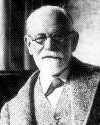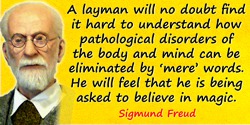 (source)
(source)
|
Sigmund Freud
(6 May 1856 - 23 Sep 1939)
Austrian psychiatrist and psychologist known as the father of psychoanalysis. One of his best known works is Interpretation of Dreams (1900).
|
Sigmund Freud Quotes on Psychoanalysis (18 quotes)
>> Click for 55 Science Quotes by Sigmund Freud
>> Click for Sigmund Freud Quotes on | Sexuality |
>> Click for 55 Science Quotes by Sigmund Freud
>> Click for Sigmund Freud Quotes on | Sexuality |
[The child] takes his play very seriously and he expends large amounts of emotion on it. The opposite of play is not what is serious but what is real.
— Sigmund Freud
Creative Writers and Day-Dreaming (1906), In James Strachey (ed.), The Standard Edition of the Complete Psychcological Works of Sigmund Freud (1959), Vol 9, 144.

A layman will no doubt find it hard to understand how pathological disorders of the body and mind can be eliminated by 'mere' words. He will feel that he is being asked to believe in magic. And he will not be so very wrong, for the words which we use in our everyday speech are nothing other than watered-down magic. But we shall have to follow a roundabout path in order to explain how science sets about restoring to words a part at least of their former magical power.
— Sigmund Freud
Psychical (or Mental) Treatment (1905), In James Strachey (ed.), The Standard Edition of the Complete Psychological Works of Sigmund Freud (1953), Vol. 7, 283.
Being in love with the one parent and hating the other are among the essential constituents of the stock of psychical impulses which is formed at that time and which is of such importance in determining the symptoms of the later neurosis... This discovery is confirmed by a legend that has come down to us from classical antiquity: a legend whose profound and universal power to move can only be understood if the hypothesis I have put forward in regard to the psychology of children has an equally universal validity. What I have in mind is the legend of King Oedipus and Sophocles' drama which bears his name.
— Sigmund Freud
The Interpretation of Dreams (1900), In James Strachey (ed.) The Standard Edition of the Complete Psychological Works of Sigmund Freud (1953), Vol. 4, 260-1.
Every dream will reveal itself as a psychological structure, full of significance.
— Sigmund Freud
First sentence of Chapter 1, 'The Scientific Literature on the Problems of the Dream, The Interpretation of Dreams (1900) as translated by A.A. Brill (1913), 1.
In matters of sexuality we are at present, every one of us, ill or well, nothing but hypocrites.
— Sigmund Freud
Sexuality in the Aetiology of the Neuroses (1898), In James Strachey (ed.), The Standard Edition of the Complete Psychological Works of Sigmund Freud (1952), Vol. 3, 266.
In the course of centuries the naïve self-love of men has had to submit to two major blows at the hands of science. The first was when they learnt that our earth was not the centre of the universe but only a tiny fragment of a cosmic system of scarcely imaginable vastness… the second blow fell when biological research destroyed man’s supposedly privileged place in creation and proved his descent from the animal kingdom and his ineradicable animal nature… But human megalomania will have suffered its third and most wounding blow from the psychological research of the present time which seeks to prove to the ego that it is not even master in its own house, but must content itself with scanty information of what is going on unconsciously in its mind.
— Sigmund Freud
Introductory Lectures on Psychoanalyis (1916), in James Strachey (ed.), The Standard Edition of the Complete Psychological Works of Sigmund Freud (1963), Vol. 16, 284-5.
In view of the kind of matter we work with, it will never be possible to avoid little laboratory explosions.
— Sigmund Freud
Letter to Carl Jung, 18 Jun 1909. Quoted in William McGuire (ed.), The Freud-Jung Letters: The Correspondence between Sigmund Freud and C. G. Jung (1974), 235.
It might be said of psychoanalysis that if you give it your little finger, it will soon have your whole hand.
— Sigmund Freud
…...
Neurosis is the result of a conflict between the ego and its id, whereas psychosis is the analogous outcome of a similar disturbance in the relation between the ego and the external world.
— Sigmund Freud
Neurosis and Psychosis (1924), in James Strachey (ed.), The Standard Edition of the Complete Psychological Works of Sigmund Freud (1961), Vol. 19, 149.
Sexuality is the key to the problem of the psychoneuroses and of the neuroses in general. No one who disdains the key will ever be able to unlock the door.
— Sigmund Freud
Fragment of an Analysis of a Case of Hysteria (1905), In James Strachey (ed.), The Standard Edition of the Complete Psychological Works of Sigmund Freud (1953), Vol. 7, 115.
The ego is not master in its own house.
— Sigmund Freud
From the History of an Infantile Neuroses (1918), in James Strachey (ed.), The Standard Edition of the Complete Psychological Works of Sigmund Freud (1955), Vol. 17, 143.
The excremental is all too intimately and inseparably bound up with the sexual; the position of the genitals—inter urinas et faeces—remains the decisive and unchangeable factor. One might say here, varying a well-known saying of the great Napoleon: 'Anatomy is destiny'.
— Sigmund Freud
On the Universal Tendency to Debasement in the Sphere of Love (Contributions to the Psychology of Love) (1912), In James Strachey (ed.), The Standard Edition of the Complete Psychological Works of Sigmund Freud (1957), Vol 11, 189.
The great question that has never been answered and which I have not been able to answer, despite my thirty years of research into the feminine soul, is 'What does a woman want?'
Freud once said to Marie Bonaparte.
Freud once said to Marie Bonaparte.
— Sigmund Freud
Quoted in Ernest Jones (ed.), Sigmund Freud: Life and Work (1955), Vol. 2, 468.
The interpretation of dreams is the royal road to a knowledge of the unconscious activities of the mind.
— Sigmund Freud
The Interpretation of Dreams (1900), In James Strachey (ed.), The Standard Edition of the Complete Psychological Works of Sigmund Freud (1953), Vol. 5, 608.
The psychoanalysis of individual human beings, however, teaches us with quite special insistence that the god of each of them is formed in the likeness of his father, that his personal relation to God depends on his relation to his father in the flesh and oscillates and changes along with that relation, and that at bottom God is nothing other than an exalted father.
— Sigmund Freud
(Originally published 1913). Totem and Taboo, vol. 13, pt. 4, sct. 6, Complete Works, Standard Edition, eds. James Strachey and Anna Freud (1953).
The unconscious is the true psychical reality; in its innermost nature it is as much unknown to us as the reality of the external world, and it is as incompletely presented by the data of consciousness as is the external world by the communications of our sense organs.
— Sigmund Freud
The Interpretation of Dreams (1900), In James Strachey (ed.), The Standard Edition of the Complete Psychological Works of Sigmund Freud (1953), Vol. 5, 613.
We may lay it down that a happy person never phantasises, only an unsatisfied one... The motive forces of phantasies are unsatisfied wishes, and every single phantasy is the fulfilment of a wish, a correction of unsatisfying reality. These motivating wishes vary according to the sex, character and circumstances of the person who is having the phantasy; but they fall naturally into two main groups. They are either ambitious wishes, which serve to elevate the subject's personality; or they are erotic ones. It was shocking when Nietzsche said this, but today it is commonplace; our historical position—and no end to it is in sight—is that of having to philosophise without 'foundations'.
— Sigmund Freud
Creative Writers and Day-Dreaming (1906), In James Strachey (ed.), The Standard Edition of the Complete Psychcological Works of Sigmund Freud (1959), Vol 9, 146-7.
You may take it as an instance of male injustice if I assert that envy and jealousy play an even greater part in the mental life of women than of men. It is not that I think these characteristics are absent in men or that I think they have no other roots in women than envy for the penis; but I am inclined to attribute their greater amount in women to this latter influence.
— Sigmund Freud
New Introductory Lectures on Psycho-Analysis (1933), in James Strachey (ed.), The Standard Edition of the Complete Psychological Works of Sigmund Freud (1964), Vol. 22, 125.



See also:
- 6 May - short biography, births, deaths and events on date of Freud's birth.
![Sigmund Freud quote: [The child] takes his play very seriously and he expends large amounts of emotion on it. The opposite of pl](https://todayinsci.com/F/Freud_Sigmund/FreudSigmund-Play500x250px.jpg)



 In science it often happens that scientists say, 'You know that's a really good argument; my position is mistaken,' and then they would actually change their minds and you never hear that old view from them again. They really do it. It doesn't happen as often as it should, because scientists are human and change is sometimes painful. But it happens every day. I cannot recall the last time something like that happened in politics or religion.
(1987) --
In science it often happens that scientists say, 'You know that's a really good argument; my position is mistaken,' and then they would actually change their minds and you never hear that old view from them again. They really do it. It doesn't happen as often as it should, because scientists are human and change is sometimes painful. But it happens every day. I cannot recall the last time something like that happened in politics or religion.
(1987) -- 


